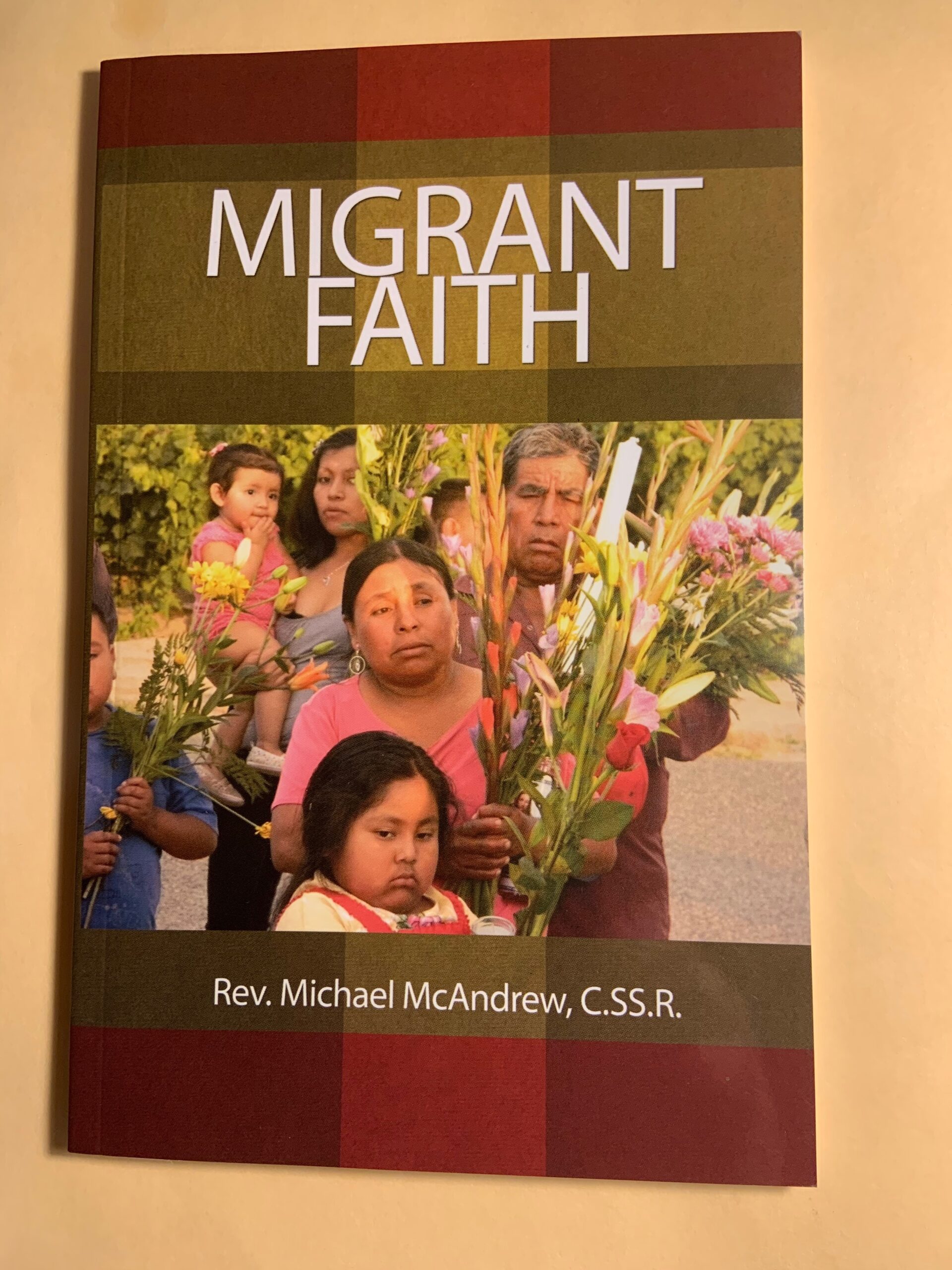Migrant Faith, Introduction
Dear friends of Padre Migrante,
From 2009 to 2013, I was the Director for Campesino Ministry for the Diocese of Fresno. In January 2013, I announced to our Committee for Extraordinary Migrant Ministry, that I would be leaving in May. One of the members said, “Before you leave, you need to write a book about what you taught us over the past four years.” Another said that he had a small publishing company, and a teacher said that she had edited several publications. With their help, I said that I would work with them, thinking that I would try to leave them with some form of record of some of our training sessions. The project surprisingly ended in the book, Migrant Faith. In the time since publishing the book, I realize that the book is not about actions and programs, but the story of loving people on the margins of the church. It is not about how to do migrant ministry, but how to honor and support the faith of migrants.
For the next few days, I will highlight parts of the book that honor the faith of migrants.
Fr. Michael McAndrew, C.Ss.R.
Introduction for Migrant Faith
In an address to representatives of the media on March 16, 2013, Pope Francis explained his decision to take the name Francis. He said that during his election, “Cardinal Claudio Hummes, a good friend … When things were looking dangerous, he encouraged me. And when the votes reached two thirds … gave me a hug and a kiss, and said: ‘Don’t forget the poor!’ And those words came to me: the poor, the poor. Then right away, thinking of the poor, I thought of Francis of Assisi. Then I thought of all the wars … Francis is also the man of peace. That is how the name came into my heart: Francis of Assisi. For me, he is the man of poverty, the man of peace, the man who loves and protects creation; these days we do not have a very good relationship with creation, do we? He is the man who gives us this spirit of peace, the poor man … How I would like a Church which is poor and for the poor!” (Audience to representatives of the communications media, March 16, 2013)
In his initial days, in his actions, Pope Francis showed the intimate care of Christ and the Church for the poor. “Migrant Faith” is the reflection of a Redemptorist missionary on twenty-three years of walking with migrants, discovering the faith, hope, and love of people who have left their native lands in search of a better life for themselves and their families.
There is a saying for members of the Congregation of the Most Holy Redeemer which says that Redemptorists are called “to evangelize and to be evangelized by the poor.” It is easy to identify the responsibility of religious men to evangelize, but to experience evangelization by the poor is challenging and humbling. Migration today is a global reality affecting all nations. On every continent there are nations that send and receive people. As people leave nations torn apart by wars, natural disasters, or lack of economic opportunity, migrants seek a better life for themselves and their families.
When I began to learn Spanish, Fr. Enrique Lopez, C.SS.R. said, “I hope you are not one of those who thinks that once you learn Spanish you know all that you need to know to work with Latinos. You need to know the customs, the faith, and the struggles of my people. If you will not walk with my people, don’t bother to learn Spanish.” My walk with migrants began over twenty years ago. The migrant is the model Christian. The migrant is one who seeks a better life with trust in God, even in the most difficult of times.
Ministry with migrants exposes the minister to profound faith if the minister is open to recognizing the faith of the migrant. Migrants may stumble with expressions of doctrine and church teaching, but their faith flows from the heart. Where there is love, there is God. “Migrant Faith” invites people in ministry to appreciate the faith of people who unfortunately are often on the margins of the Church. May the Church realize the hope of Pope Francis, “How I would like a Church which is poor and for the poor!”
Queridos amigos del Padre Migrante,
De 2009 a 2013, fui Director del Ministerio Campesino de la Diócesis de Fresno. En enero de 2013, anuncié a nuestro Comité para el Ministerio Extraordinario de Migrantes que me iría en mayo. Uno de los miembros dijo: “Antes de que se vaya, debe escribir un libro sobre lo que nos enseñó durante los últimos cuatro años”. Otro dijo que tenía una pequeña editorial y una maestra dijo que había editado varias publicaciones. Con su ayuda, les dije que trabajaría con ellos, pensando que trataría de dejarles algún tipo de registro de algunas de nuestras sesiones de entrenamiento. El proyecto terminó sorprendentemente en el libro Migrant Faith. En el tiempo transcurrido desde la publicación del libro, me doy cuenta de que el libro no trata sobre acciones y programas, sino sobre la historia de amar a personas al margen de la iglesia. No se trata de cómo hacer un ministerio migrante, sino de cómo honrar y apoyar la fe de los migrantes.
Durante los próximos días, destacaré partes del libro que honran la fe de los migrantes.
Padre Miguel McAndrew, C.Ss.R.
Introducción a la Fe del Migrante
En una audiencia ante representantes de los medios de comunicación el 16 de marzo de 2013, el Papa Francisco explicó su decisión de tomar el nombre Francisco. Dijo que durante su elección: “El Cardenal Claudio Hummes, un gran amigo, … Cuando la cosa se ponía un poco peligrosa, él me animaba. Y cuando los votos subieron a los dos tercios … él me abrazó, me besó, y me dijo: «¡No te olvides de los pobres!» Y esas palabras me llegaron: los pobres, los pobres. De inmediato, pensando en los pobres, pensé en Francisco de Asís. Después pensé en todas las guerras … Francisco también es el hombre de la paz. Y así, el nombre me llegó al corazón: Francisco de Asís. Para mí él es el hombre de la pobreza, el hombre de la paz, el hombre que ama y custodia la creación; en estos días no tenemos una relación muy agradable con la creación ¿verdad? Él es el hombre que nos da este espíritu de paz, el hombre pobre… ¡Ah, cómo quisiera una Iglesia pobre y para los pobres!”
En sus primeros días, en sus acciones el Papa Francisco mostró el cuidado íntimo de Cristo y de la Iglesia por los pobres. La Fe del Migrante es la reflexión de un misionero Redentorista que lleva veintitrés años caminando con los migrantes descubriendo la fe, la esperanza y el amor de quienes han dejado su tierra natal en busca de una vida mejor para ellos y sus familias.
Hay un refrán para los miembros de la Congregación del Santísimo Redentor, que dice que los Redentoristas son llamados a “evangelizar y ser evangelizados por los pobres”. Es fácil identificar la responsabilidad de los religiosos a evangelizar, pero experimentar la evangelización de los pobres es un reto y nos hace humildes. Hoy la migración es una realidad global que afecta a todas las naciones. En cada continente hay naciones que envían y reciben migrantes. Al salir de las naciones destrozadas por guerras, por desastres naturales y por falta de oportunidades económicas, los migrantes buscan una vida mejor para ellos y sus familias.
Cuando empecé a aprender español, el Padre Enrique López, C.SS.R. me dijo: “Espero que no seas uno de esos que piensa que cuando aprende el español, ya sabe todo lo que necesita saber para trabajar con los latinos. Necesitas conocer las costumbres, la fe y la lucha de mi pueblo. Si no caminas con mi pueblo, no te molestes en aprender español”. Mi caminar con los migrantes empezó hace más de veinte años. El migrante es el modelo de ser cristiano. El migrante es alguien que busca una vida mejor con confianza en Dios, aún en los tiempos más difíciles.
El ministerio con los migrantes expone al ministro a una fe profunda si el ministro está dispuesto a reconocer la fe del migrante. El migrante puede vacilar con expresiones de la doctrina y la enseñanza de la Iglesia, pero su fe fluye desde el corazón. Donde hay amor, hay Dios. La Fe del Migrante invita a la gente en el ministerio a apreciar la fe de las personas que desafortunadamente con frecuencia están al margen de la Iglesia. Esperemos que la Iglesia cumpla la esperanza del Papa Francisco: “¡Ah, cómo quisiera una Iglesia pobre y para los pobres!”




